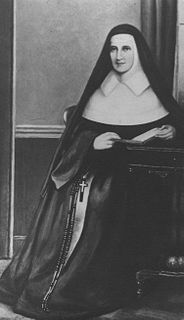Related Research Articles

Sense and Sensibility is a novel by Jane Austen, published in 1811. It was published anonymously; By A Lady appears on the title page where the author's name might have been. It tells the story of the Dashwood sisters, Elinor and Marianne as they come of age. They have an older half-brother, John, and a younger sister, Margaret.

Helen Elizabeth Hunt is an American actress and film-maker. She is the recipient of numerous accolades, including an Academy Award and four Emmy Awards.

The Salvation Army (TSA) is a Protestant Christian church and an international charitable organisation. The organisation reports a worldwide membership of over 1.7 million, consisting of soldiers, officers and adherents collectively known as Salvationists. Its founders sought to bring salvation to the poor, destitute, and hungry by meeting both their "physical and spiritual needs". It is present in 132 countries, running charity shops, operating shelters for the homeless and disaster relief, and humanitarian aid to developing countries.

William Booth was an English Methodist preacher who, along with his wife, Catherine, founded the Salvation Army and became its first "General" (1878–1912). The Christian movement with a quasi-military structure and government founded in 1865 has spread from London, England, to many parts of the world and is known for being one of the largest distributors of humanitarian aid. In 2002, Booth was named among the 100 Greatest Britons in a BBC poll.

Mother Mary Teresa Bojaxhiu, honoured in the Catholic Church as Saint Teresa of Calcutta, was an Albanian-Indian Roman Catholic nun and missionary. She was born in Skopje, then part of the Kosovo Vilayet of the Ottoman Empire. After living in Skopje for eighteen years, she moved to Ireland and then to India, where she lived for most of her life.

Catherine Booth was co-founder of The Salvation Army, along with her husband William Booth. Because of her influence in the formation of The Salvation Army she was known as the 'Mother of The Salvation Army'.

Catherine McAuley was an Irish religious sister who founded the Sisters of Mercy in 1831. The women's congregation has always been associated with teaching, especially in Ireland, where the sisters taught Catholics at a time when education was mainly reserved for members of the established Church of Ireland.

Rosie the Riveter was an allegorical cultural icon of World War II, representing the women who worked in factories and shipyards during World War II, many of whom produced munitions and war supplies. These women sometimes took entirely new jobs replacing the male workers who joined the military. Rosie the Riveter is used as a symbol of American feminism and women's economic advantage.

The work of Catholic nun and missionary Anjezë Gonxhe Bojaxhiu, commonly known as Mother Teresa and from 2016 as Saint Teresa of Calcutta, received mixed reactions from prominent people, governments and organisations. Her practices, and those of the Missionaries of Charity, the order which she founded, were subject to numerous controversies. These include objections to the quality of medical care which they provided, suggestions that some deathbed baptisms constituted forced conversion, and alleged links to colonialism and racism and to relations to questionable public figures. The controversy extends to include the large sums of money donated to her as well as the Vatican for ignoring the criticisms raised.

Elinor Claire "Lin" Ostrom was an American political economist whose work was associated with the New Institutional Economics and the resurgence of political economy. In 2009, she was awarded the Nobel Memorial Prize in Economic Sciences for her "analysis of economic governance, especially the commons", which she shared with Oliver E. Williamson. She was the first woman to win the Nobel Prize in Economics.

Elinor Carucci is an Israeli-American Fine Art Photographer. She is based in New York City.

Darleane Christian Hoffman is an American nuclear chemist who was among the researchers who confirmed the existence of Seaborgium, element 106. She is a faculty senior scientist in the Nuclear Science Division of Lawrence Berkeley National Laboratory and a professor in the graduate school at UC Berkeley. In acknowledgment of her many achievements, Discover Magazine recognized her in 2002 as one of the 50 most important women in science.
Gwen Hennessey, O.S.F., is a Roman Catholic Franciscan Sister and peace activist, most widely known for her protests against the School of the Americas.

Florence Eleanor Booth was the wife of Bramwell Booth, Second General of The Salvation Army.

Commissioner Catherine Bramwell-Booth, born Catherine Booth Booth, Salvation Army officer, was one of seven children born to General Bramwell Booth and Florence Eleanor Soper, and was the granddaughter of the Salvation Army's Founder, General William Booth and his wife Catherine Mumford, known as the 'Mother of the Salvation Army'. In her later years Bramwell-Booth became well-known through her books and various radio and television appearances. Bramwell-Booth lived to be 104.

Natalie Denise Suleman, known as Octomom in the media, is an American media personality who came to international attention when she gave birth to octuplets in January 2009. One week after their birth, they surpassed the previous worldwide survival rate for a complete set of octuplets set by the Chukwu octuplets in 1998. The circumstances of their high order multiple birth led to controversy in the field of assisted reproductive technology as well as an investigation by the Medical Board of California of the fertility specialist involved.

Commissioner Frederick St. George de Lautour Booth-Tucker, was a senior Salvation Army officer of the late nineteenth and early twentieth centuries, and the son-in-law of Willam and Catherine Booth, the Army's founders.

Rhoda Mary Abbott was a passenger on the RMS Titanic. She was the only female passenger who went down with the sinking of the ship and survived.
Gesine Bullock-Prado is an American pastry chef, TV personality, author, attorney, and former film executive.

Alva Forsius was a Finnish midwife and social worker. One of the founding members of the Finnish Salvation Army, she became aware of the effects of poverty and unsanitary conditions for new mothers. She established the first maternity home in Porvoo, published materials to educate women on childbirth and sanitation, and provided counseling for new mothers. Recognizing the needs of unwed mothers, she established one of the first homes to offer single mothers training and follow-up care so that they were able to provide for both the health and economic welfare of their families. Raising three foster daughters, as a single parent, she dedicated her time to helping mothers and children. In later life, she established a private retirement home for women.
References
- ↑ "The Frugal Voice Of her Mother". 2014-11-12. Archived from the original on 2016-03-02. Retrieved 2016-02-21.
- ↑ "Mary Elinor Sauerwein obituary" . Retrieved 2016-02-21.
- ↑ "'Poor' Woman Leaves Close to $2 Million to Salvation Army". 2012-01-31. Retrieved 2016-02-21.
- ↑ "Elinor Sauerwein, 96-Year-Old Millionaire, Lived Poor And Quietly Donated $1.7 Million". 2012-01-25. Retrieved 2016-02-21.